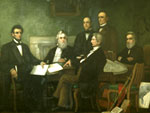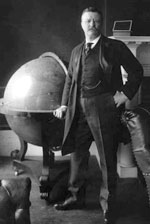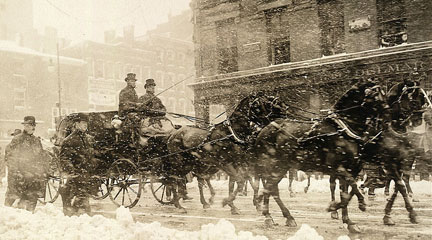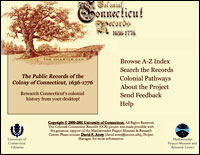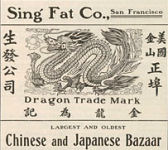Letters from the Philippines
Video 1:
- Photo. Downtown Beatrice, Nebraska. 1887.
- Image. Wadhams, William H. "U.S.S. Maine." c.1898. New York Public Library Digital Gallery, Image ID: 1648984.
- Photo. "U.S.S. Maine." NHHC Collection. Photo No. 61236.
- Photo. "Details of the wreck of the U.S.S. Maine." 1898. New York Public Library Digital Gallery, Image ID: 114482.
- Photo. "Beatrice Military Band." 1898. Gage County Historical Society.
- Painting. "Off For the War." J.W. Buell. Behind the Guns with American Heroes. Chicago: International Publishing Co.. 1899.
- "Troops for Manila, Last Man." 1899. Calisphere/Keystone-Mast Collection, UCR/California Museum of Photography, University of California at Riverside.
- Photo. "George Dewey." William McKinley. Exciting Experiences in Our Wars with Spain and the Filipinos. Chicago: Book Publishers Union, 1899.
- Image. "Admiral Dewey at the Battle of Manila." NHHC Collection, Photo No. NH 84510-KN.
- Image. "Battle of Manila Bay." NHHC Collection, Photo No. NH91881-KN.
- "Map of Manila Bay." J.W. Buell. Behind the Guns with American Heroes. Chicago: International Publishing Co.. 1899, 496.
- Image. "In the Court of Ayuntamiento, After the Surrender." Scribner's Magazine, 24:6 (December 1898): 684.
- Photo. Rau Studios. "Emilio Aguinaldo." New York Public Library Digital Galley, Image ID: 437565.
- Photo. Rau Studios. "Aguinaldo and his Advisors." New York Public Library Digital Galley, Image ID: 437566.
- Photo. "Church in the Plaza Calderon de Barca." Scribner's Magazine, 24:6. (December 1898): 683.
- Illustration. "Puzzle Picture." William McKinley. Exciting Experiences in Our Wars with Spain and the Filipinos. Chicago: Book Publishers Union, 1899.
- Illustration. "The Eyes of the World Are Upon Him." William McKinley. Exciting Experiences in Our Wars with Spain and the Filipinos. Chicago: Book Publishers Union, 1899.
- Photo. "Guard at the causeway connecting Cavite and San Rogue. Cavite, P.I." Calisphere/Keystone-Mast Collection, UCR/California Museum of Photography, University of California at Riverside.
- Photo. "Types of Spanish Soldiers in the Southern Philippines." 1899–1900. New York Public Library Digital Galley, Image ID: 831254.
Video 2:
- Photo. "Group of American Soldiers, San Roque (Cavite), Philippines." c.1899. Library of Congress, Prints and Photographs Division, #LC-USZ6-1511. http://www.loc.gov/pictures/item/2002724002/#
- Photo. "A Filipino Restaurant, Manila, Philippine Islands." Calisphere/Keystone-Mast Collection, UCR/California Museum of Photography, University of California at Riverside.
- Photo. "View of a Suburb of Manila." J.W. Buell. Behind the Guns with American Heroes. Chicago: International Publishing Co., 1899.
- Photo. "Filipino Bamboo Band, Philippines." Calisphere/Keystone-Mast Collection, UCR/California Museum of Photography, University of California at Riverside.
- Cartoon. "Pinned." William McKinley. Exciting Experiences in Our Wars with Spain and the Filipinos. Chicago: Book Publishers Union, 1899.
- Print. Kurtz & Allison. "Spanish-American Treaty of Paris." December 10, 1898. Library of Congress Prints and Photographs Division, No. LC-DIG-pgs-01948.
- Illustration. "Peace." William McKinley. Exciting Experiences in Our Wars with Spain and the Filipinos. Chicago: Book Publishers Union, 1899.
- Cartoon. "Uncle Sam." Milwaukee Journal, August 10, 1898.
- Cartoon. Berryman, Clifford. Untitled cartoon. Washington Post, February 4, 1899. National Archives, Archival Research Catalogue, Identifier No. 6010306.
- Cartoon. Berryman, Clifford. "A Burden That Cannot Be Honorably Disposed of at Present." Washington Post, September 25, 1899. National Archives, Archival Research Catalogue, Identifier No. 6010332.
Video 3:
- Photo. "The 14th Infantry Entrenched at Pasig, P.I." Calisphere/Keystone-Mast Collection, UCR/California Museum of Photography, University of California at Riverside.
- Photo. "William McKinley." c.1900. Library of Congress, Prints and Photographs Division, No. LC-USZ62-13025.
- Cartoon. "How Some Apprehensive People Picture Uncle Sam After the War." Milwaukee Journal, May 16, 1898.
- Photo. "Aguinaldo, A Prisoner on the U.S.S. Vicksburg." March, 1901. New York Public Library Digial Gallery, Image ID: 114144.
- Image. William McKinley. William McKinley. Exciting Experiences in Our Wars with Spain and the Filipinos. Chicago: Book Publishers Union, 1899.
- Cartoon. "Not Laughing at Uncle Sam Now." Denver Evening Post, July 5, 1898.
- Cartoon. Berryman, Clifford. "Not in a Position to Give Up the Chase." Washington Post, May 1, 1899. National Archives, Archival Research Catalogue, Identifier No. 6010319.
- Cartoon. "Uncle Sam's Schoolhouse of Democracy." Denver Evening Post, December 28, 1898.
- Cartoon. "Uncle Sam Finds the Philippines to be Stubborn." Denver Evening Post, February 16, 1899.
Video 4:
- Photo. "Outpost Guards, Cavite, P.I." c.1899. Library of Congress, Prints and Photographs Division, No. LC-USZ62-108482.
- Photo. "Small Horses, Cavite, P.I." c.1899. Photographs Division, No. LC-USZ62-108481.
- Photo. "Headquarters of the Second Oregon Volunteers." March 13, 1899. New York Public Library Digital Gallery, Image ID: 814052.
- Photo. "A Short Rest on the Fighting Line, Malabon." Calisphere/Keystone-Mast Collection, UCR/California Museum of Photography, University of California at Riverside.
Primary sources reveal many different perspectives on historical events. At home, the U.S. government painted the Philippine-American War as an act of liberation, freeing the Philippines from oppression. Paul A. Kramer analyzes letters from American soldiers in the Philippines that show a very different view of the war.
I'm going to be talking about letters from the Philippines written by a soldier named Andrew Wadsworth from Nebraska between the years 1898 and 1900.
Andrew Wadsworth is born in New Lebanon, NY, in 1869; he moves out to Beatrice, NE, to live with his uncle in 1887. He works in his uncle's jewelry shop. In the meantime, he enlists in Company C of the Nebraska National Guard. In 1897, tensions are heating up between the U.S. and Spain over the status of Cuba. At that point, the United States had long standing interests in Cuba in terms of sugar, in terms of the U.S.'s larger strategic objectives. When a humanitarian crisis erupts over Spain's attempt to suppress a Cuban rebellion, this inflames a humanitarian crusade in the United States to do something. The American public begins to be prepared for some sort of intervention. As is well known, the U.S.S Maine is sent to the Havana harbor in the spring of 1898 to protect American options and also to protect Americans in Cuba, and it's blown up. This inflames the American public for war.
Wadsworth in Nebraska is learning about what's happening. He sees that his company is about to be mobilized. He is not sent to Cuba to fight in the Spanish-Cuban-American War, but in fact he's sent west. He's sent west because the first campaign of the war against Spain is in fact—the decision to send Commodore Dewey and the Pacific Squadron to Manila, which was in Spain's last and largest colony in Asia at that time. This was very much part of a larger strategic plan to extend U.S. power into Asia; to get U.S. bases and naval power close to China. So Wadsworth is sent along with his company first to San Francisco—where he's mustered out—and then he's sent to Honolulu, and then they end up in Manila, after Dewey has defeated the Spanish navy. He's part of an initial group of about 13,000 U.S. soldiers that are sent after the Spanish fleet is destroyed. He finds himself in Cavite, near Manila, and spends several months kind of wondering what his forces are in fact doing there: the Spanish have been defeated in terms of naval power.
At that time a Filipino revolution has—which had initially been defeated by Spain in 1897—has been renewed, has successfully overthrown Spanish power on the mainland of Luzon. The U.S.'s relationship to that revolution is unclear. Wadsworth is able to see the revolution's battles against Spain at a distance, but he's not really sure exactly what U.S. forces are doing there. He says this in his letters. He says, "It's strange that we're here because, as far as we're concerned, the battle against the Spanish has been won at sea."
In August, the United States basically coordinates with Spain to have the Spanish surrender the capitol city of Manila. There's a battle—it's very brief—U.S. forces occupy the city, and importantly they make sure that the revolution stays out of the capitol. Again, there's this very ambiguous relationship between U.S. and Filipino forces. On the one hand, there's a kind of tacit understanding that the U.S. is there to liberate the Philippines from Spain, but it's not clear whether that's to liberate it for the United State's purposes or Filipino purposes. Then it becomes very clear—when U.S. forces basically take the capitol and occupy it, protecting Spaniards from Filipino insurgents—that they’re there to occupy the isles.
Wadsworth and his unit end up in Manila—which is a highly armed area—and he says we can walk around here without weapons it's so locked-down, against both internal disruption and also in terms of outside Filipino forces.
You can see Wadsworth's perceptions of Filipinos changing over the time period that he's in the Philippines. From the mid-1898 period when he arrives—when he has kind of this ambiguous relationship to the campaign in the Philippines—to the early part of 1899, when the war against the Filipinos starts.
In the pre-war period, when he's in Manila, he and other soldiers have a set of very complex interactions with the Filipinos on the ground. Filipinos run a lot of the shops in the area—there's casual commercial contact in terms of bars, in terms of buying fruit, buying food. Wadsworth in his letters reflects a certain ambivalence about Filipinos and about Filipino society. He reflects on the fact that Manila is not as highly hygienic as he'd like it to be. When it comes to Filipinos, he has a lot of nice things to say actually. For example, Filipino bands will come to the military bases in order to play to entertain these troops that aren't fighting. Wadsworth writes about these very lively evenings in which Filipino bands will play, soldiers will sing, it will be this lively several hours, and then he'll say Filipinos are natural-born musicians and artists, for example. At one point, even before he lands in Manila, he reflects casually upon his first real encounter with Filipinos. He says Filipinos are "as bright and intelligent as the average run of people." So it's this kind of offhanded, yeah, they're sort of like us, they're kind of like everyday people that I know.
During that window in late 1898, Wadsworth and his comrades are basically just hanging out in Manila. There's a lot of description of touring, seeing the sights, he's feasting; by the end of 1898 he's starting to get a little bored, they really are beginning to wonder what the heck they're doing there. Wadsworth says, "We came here to fight, and it doesn't look like we're going to get to fight anybody here." That reality changes towards the end of 1898.
U.S. diplomats settle the status of the Philippines at the Treaty of Paris, that begins to meet in the fall of 1898. No Filipino delegates or diplomats are allowed to participate. So this is basically the United States and Spain sitting down to negotiate the fate of the islands—not reflecting the fact that much of the islands are, in fact, not occupied by the U.S. or Spain, but in fact a Philippine government that's declared itself independent. When word gets back that the U.S. has basically pushed Spain to surrender sovereignty over the islands for a payment of $20 million, it becomes clear to the Filipinos on the ground that the U.S.'s formal statements that it is engaging in what was called "benevolent assimilation," were in fact not so benevolent—that in fact the U.S. is preparing a military occupation. So tensions on the ground begin to rise.
In February 1899, just on the brink of the Senate's ratification of the Treaty of Paris, fighting breaks out on the outskirts of Manila between U.S. and Filipino forces when U.S. sentries fire on some Filipino sentries. So suddenly there's war in the Philippines. It's not clear exactly what this conflict is going to be called. To call it a "war" would be to acknowledge that this is a [conflict] with an independent state. So, the official language that's used in the U.S. is that this is an "insurrection," this is in a sense a kind of internal problem of law and order against our legitimate authority.
Wadsworth finds himself fighting on the outskirts of Manila during the early months of the campaign. As I was tracking his letters in the archive from this period where he's hanging out in Manila, socializing, having a good time, into the war period, very quickly his language changes in terms of describing Filipinos. Within the span of a few months we've seen him basically talking about Filipinos as sort of bright and intelligent as other people, to using the most hostile and violent racial language to describe them. When I saw this, I was really struck by it, because it really went against the conventional wisdom which was that the soldiers on the ground were immediately going to apply racial vocabularies from the domestic context to the Philippines. It told me a lot about the way that context really mattered for these soldiers, that something about the setting itself and the kind of situation in which they found themselves was fundamentally shaping the way they understood their presence in the Philippines.
There's a whole series of efforts to minimize the conflict even when it's happening. There's this initial decision to call it the "Philippine Insurrection." But then one of the things that we see—which I think is very striking—is a whole series of declarations that the war is over. In any case, the war bogs down in 1900. In November 1900, there's a presidential election [and] McKinley is reelected. [It was] an election that had as one of its major themes the question of imperialism. This is seen as a referendum on imperialism by the advocates of the war; they say, "Well, the Filipinos can't possibly sustain any more resistance now that the American people have spoken, so the war is over yet again." Of course, the resistance continues. Then, in March 1901, Aguinaldo is captured; the declaration is, "Well, now the revolution can't proceed without its main leader." Resistance continues yet again. Then in basically May of 1902, Theodore Roosevelt makes a public announcement that the war is over.
I think one of the interesting things about U.S. colonialism at the turn of the century is that it's waged and promoted in the language of liberation, at least initially. This in some ways begins in the Cuban context, with the question of liberating Cuba from the oppressive Spanish. So [there's] this language of where the U.S. intervenes it's going to liberate. That really becomes quite powerful in the American public sphere. And I think this gets transferred to some extent to the Philippine context, because when the U.S. intervenes initially in the Philippines it imagines that it's going to be liberating Filipinos from oppressive Spanish rule. There's a sense that this liberation is going to be freeing, it's going to be benevolent, it's going to reflect positively on the kind of world power that the U.S. is going to be.
One of the important audiences for this kind of language is the European powers. Up until 1898, the U.S. has a kind of inferiority complex vis-à-vis the European powers. Here it is, it's this growing industrial giant that has conquered and consolidated its hold on the North American continent in the 19th century, but it doesn't have overseas colonies at a time when that is the measure of what it is to be a European power. 1898 is an important moment in terms of sending those messages out to the world. The U.S. is now on the world stage. But in doing so, it doesn't want to appear to be identical to the European powers. So, the language of liberation is also about trying to set some distance between the U.S. and the European powers. It says, yes we are going to be an empire-building nation, but in fact we're going to liberate our subjects rather than conquer them.
In some of the soldiers' letters you have that of sense of a kind of perverse sense of ingratitude—we're here to liberate you, and you clearly don't understand our good intentions. The way I see this manifesting itself most, though, is in very sarcastic use of a language of liberation in soldiers' letters. The soldiers are able to get a hold of newspapers from the United States that their families are sending them, so they know that senators who are defending the war are talking about uplift, are taking about civilization and benevolence, and they look at the kind of war they're fighting. For them this is a kind of degraded form of war, so they see this language of uplift and benevolence coming through in terms of justifying this war and their response is one of bitter irony.
I had been studying this war for a while by the time that I got to the archives and the fact that I was surprised by what I saw is something that on the one hand I think many historians experience. You go into the archives with one set of questions, and if you are really paying attention to what's in front of your face, it will inevitably change your opinion. It needs to change your opinion, because if it doesn't alter your preconceptions, then you are imposing them on the sources rather than letting the sources speak to you.
With that said, the fact that I was surprised by what I saw also says that the soldiers' opinions are not really well collected, they are not very available to students or to scholars even. And I think there may be a number of reasons for that. When I think of how an archive gets built, how is it that a soldier's letter goes from a shoebox in somebody's attic in to an excerpted box in a textbook? That happens, I think, in part because someone—usually a family member or a community member—is aware this is historically significant. Then it gets collected, it gets archived, and I think there's something about the way that this war [had] been kind of sidelined that prevented some of that communication from happening.
